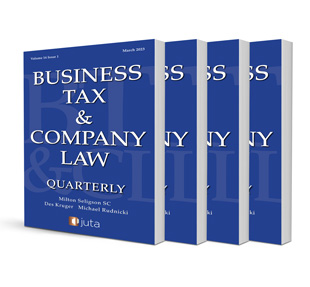
Thistle and Coronation: Can a Taxpayer Place Reliance on a Legal Opinion to Avoid or Reduce Penalties While at the Same Time Withholding Disclosure of the Opinion from SARS?
Author: Matthew Blumberg SC
ISSN: 2219-1585
Affiliations: N/A
Source: Business Tax & Company Law Quarterly, Volume 15 Issue 1, 2024, p. 20 – 27
Abstract
Understatement penalties1 featured in two tax cases recently argued in the Constitutional Court. In both cases, the taxpayer had sought to avoid or reduce liability for understatement penalties on the basis that the taxpayer’s contentious tax position had been based on a favourable legal opinion. In the one case, the opinion was disclosed to SARS. In the other, it was not. In the latter case, SARS contended that the taxpayer ought to have disclosed the opinion and adduced it in evidence. The SCA had disagreed, finding that ‘it was not incumbent on [the taxpayer] to disclose a tax opinion that it had obtained, any more than it would be on any other party which litigates on the basis of a procured legal opinion.’
It is, for various reasons, difficult to predict whether or not the Constitutional Court will engage with this finding. For the reasons explored below, however, taxpayers should proceed with caution before seeking to invoke the SCA-finding as authority for the proposition that they may rely on a legal opinion to avoid or reduce penalties, while at the same time withholding disclosure of the opinion from SARS.